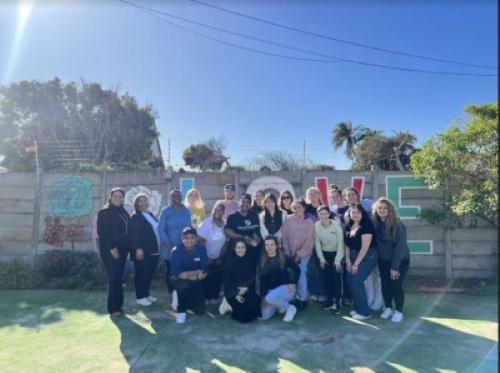Senior criminology and criminal justice and psychology double major Damiana Colley signed up to join the Department of Criminology and Criminal Justice’s July trip to Cape Town, South Africa as soon as she heard about it.
“Since I had taken ‘Slavery in the Twenty First Century: Combating Human Trafficking’ my freshman year, human trafficking research and anti-human trafficking efforts have been an area of interest for me,” Colley explained. “I have written two research papers on human trafficking in the past, as the subject of my choice in other CCJS classes.”
Colley wasn’t the only student interested in participating in the department’s “Special Topics in Study Abroad IV: Human Trafficking in Context: Corruption in Social Justice” program, led by CCJS Principal Lecturer Wendy Stickle and MLAW Senior Lecturer Christine White. Fifteen other undergraduate students joined Colley on an adventure to learn even more about human trafficking by getting to talk to survivors, and connect with professionals in the field.
To do so, the travelers worked with two organizations: S-CAPE, a faith-based organization that provides shelter and support to women and children who have been victims of sex-trafficking, and Free To Fly, an anti-trafficking organization focused on helping children.
The students went on tours, heard first-hand stories of survival from victims, listened to lectures from experts, and reviewed-case studies.
“We took a tour of the facility and I was amazed by the beauty in and around the area. The home was full of color and inspirational messages. It looked like a place of love and personality more than a temporary shelter,” Talya Deutsch wrote about visiting the S-CAPE safe house on the trip’s blog, UMD Goes to South Africa. “My favorite part was the backyard. Equipped with a sitting area, garden, shed, and stray cat it was the perfect spot to relax. It was great to think that women who have been through so much can now have a beautiful place to call their own.”
In a blog post about the group’s visit to Free to Fly, Colley wrote about how a presentation there contained information and videos on how to pick up on red flags exhibited by potential victims, and a Q&A with the speaker that focused on the organization itself, and the speaker’s journey to getting involved.
“I learned that human trafficking in South Africa encompasses various forms, exploiting the vulnerabilities of individuals within the country and outside of it,” Colley said. “We found that a lot of the country’s industries rely on labor trafficking, partly due to the history of the practice within the country, and the consequences of human trafficking in South Africa are severe and multifaceted.”
In addition to learning about what human trafficking is, what it looks like, and the challenges government agencies, law enforcement, NGOs, and civil society organizations face in solving the issue, the students also had time to learn about South African culture, and take in quite a few memorable sights. Robben Island, Table Mountain, and the group’s Aquila Game Reserve safari stood out to Cesia Delcid Hernandez, who called leaving South Africa "bittersweet" in her final blog post.
“This immersive experience significantly influenced my potential career path. I have always had a passion for victim services, specifically for sexual assault survivors, but this experience allowed me to expand my focal point to all victims of violent crimes,” Colley said. “Witnessing the impact that dedicated professionals and organizations can make on the lives of trafficking survivors solidified my desire to contribute to this field and work toward systemic change.”
This article was written by Sofia Appolonio, JOUR '26.



